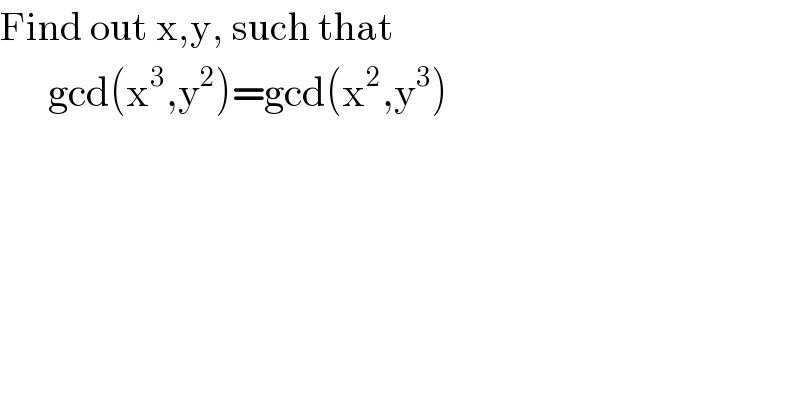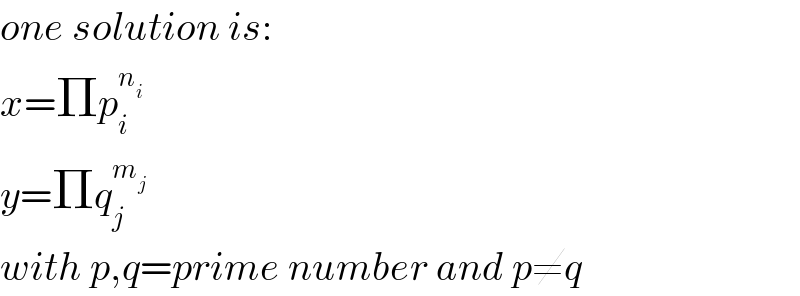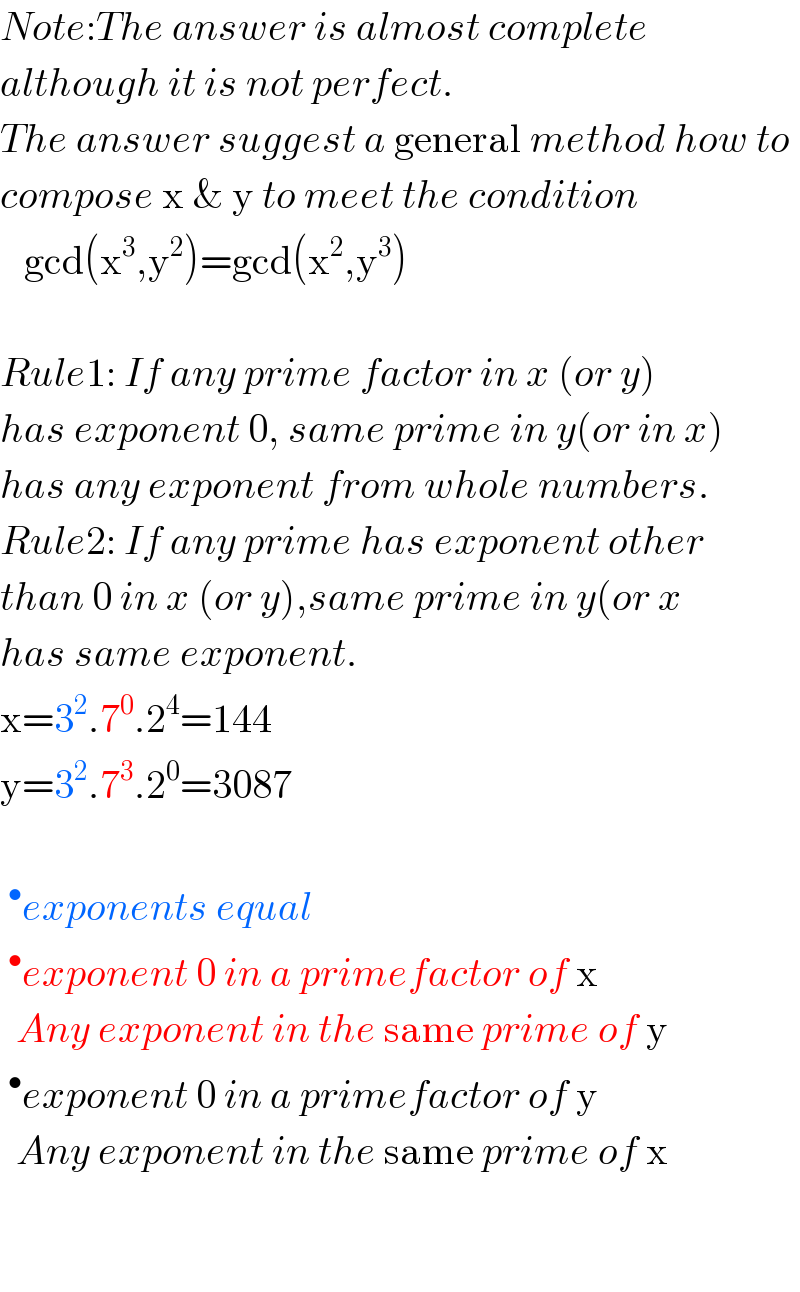
Question Number 62244 by Rasheed.Sindhi last updated on 18/Jun/19

$$\mathrm{Find}\:\mathrm{out}\:\mathrm{x},\mathrm{y},\:\mathrm{such}\:\mathrm{that} \\ $$$$\:\:\:\:\:\:\mathrm{gcd}\left(\mathrm{x}^{\mathrm{3}} ,\mathrm{y}^{\mathrm{2}} \right)=\mathrm{gcd}\left(\mathrm{x}^{\mathrm{2}} ,\mathrm{y}^{\mathrm{3}} \right) \\ $$
Commented by mr W last updated on 18/Jun/19

$${one}\:{solution}\:{is}: \\ $$$${x}=\Pi{p}_{{i}} ^{{n}_{{i}} } \\ $$$${y}=\Pi{q}_{{j}} ^{{m}_{{j}} } \\ $$$${with}\:{p},{q}={prime}\:{number}\:{and}\:{p}\neq{q} \\ $$
Commented by Rasheed.Sindhi last updated on 19/Jun/19

$$\mathcal{T}{hanks}\:\mathcal{S}{ir}!\: \\ $$$${Waiting}\:{for}\:{solutions}\:\mathrm{w}{hen}\:{x}\:\&\:{y}\:{are} \\ $$$$\:\:{noncoprime}\:{with}\:{some}\:{workings}. \\ $$
Commented by Rasheed.Sindhi last updated on 23/Jun/19

$$\mathcal{T}{he}\:{question}\:{having}\:{no}\:{market}\:{value}! \\ $$
Answered by Rasheed.Sindhi last updated on 21/Jun/19

$$\mathrm{x}=\Pi{p}_{{i}} ^{{a}_{{i}} } \:\:\:\mathrm{y}=\Pi{p}_{{i}} ^{{b}_{{i}} } \::\:\:\:\:{p}_{{i}} \in\mathbb{P}\:\:\wedge\:\:{a}_{{i}} ,{b}_{{i}} \in\mathbb{W} \\ $$$$\:\:\mathrm{gcd}\left(\mathrm{x}^{\mathrm{3}} ,\mathrm{y}^{\mathrm{2}} \right)=\mathrm{gcd}\left(\mathrm{x}^{\mathrm{2}} ,\mathrm{y}^{\mathrm{3}} \right) \\ $$$$\:\Rightarrow\mathrm{gcd}\left(\:\left(\Pi{p}_{{i}} ^{{a}_{{i}} } \right)^{\mathrm{3}} ,\left(\Pi{p}_{{i}} ^{{b}_{{i}} } \right)^{\mathrm{2}} \right)=\mathrm{gcd}\left(\:\left(\Pi{p}_{{i}} ^{{a}_{{i}} } \right)^{\mathrm{2}} ,\left(\Pi{p}_{{i}} ^{{b}_{{i}} } \right)^{\mathrm{3}} \right) \\ $$$$\:\Rightarrow\mathrm{gcd}\left(\:\Pi{p}_{{i}} ^{\mathrm{3}{a}_{{i}} } \:,\:\Pi{p}_{{i}} ^{\mathrm{2}{b}_{{i}} } \right)=\mathrm{gcd}\left(\:\Pi{p}_{{i}} ^{\mathrm{2}{a}_{{i}} } ,\:\left(\Pi{p}_{{i}} ^{\mathrm{3}{b}_{{i}} } \right)\right. \\ $$$$\Rightarrow\Pi{p}_{{i}} ^{\mathrm{min}\left(\mathrm{3}{a}_{{i}} ,\:\mathrm{2}{b}_{{i}} \right)} =\Pi{p}_{{i}} ^{\mathrm{min}\left(\mathrm{2}{a}_{{i}} ,\:\mathrm{3}{b}_{{i}} \right)} \\ $$$$\:\Rightarrow\mathrm{min}\left(\mathrm{3}{a}_{{i}} ,\:\mathrm{2}{b}_{{i}} \right)=\mathrm{min}\left(\mathrm{2}{a}_{{i}} ,\:\mathrm{3}{b}_{{i}} \right) \\ $$$${Possibilities}: \\ $$$$\:\:\:\:\:{A}:\:\:\:\:\mathrm{3}{a}_{{i}} >\mathrm{2}{b}_{{i}} \:\:\wedge\:\begin{cases}{\mathrm{2}{a}_{{i}} >\mathrm{3}{b}_{{i}} ...\left({i}\right)}\\{\mathrm{2}{a}_{{i}} =\mathrm{3}{b}_{{i}} ...\left({ii}\right)}\\{\mathrm{2}{a}_{{i}} <\mathrm{3}{b}_{{i}} ...\left({iii}\right)}\end{cases} \\ $$$$\:\:\:\:\:{B}:\:\:\:\:\mathrm{3}{a}_{{i}} =\mathrm{2}{b}_{{i}} \:\wedge\:\begin{cases}{\mathrm{2}{a}_{{i}} >\mathrm{3}{b}_{{i}} ...\left({i}\right)}\\{\mathrm{2}{a}_{{i}} =\mathrm{3}{b}_{{i}} ...\left({ii}\right)}\\{\mathrm{2}{a}_{{i}} <\mathrm{3}{b}_{{i}} ...\left({iii}\right)}\end{cases} \\ $$$$\:_{} \:\:\:\:{C}:\:\:\:\mathrm{3}{a}_{{i}} <\mathrm{2}{b}_{{i}} \:\wedge\begin{cases}{\mathrm{2}{a}_{{i}} >\mathrm{3}{b}_{{i}} ...\left({i}\right)}\\{\mathrm{2}{a}_{{i}} =\mathrm{3}{b}_{{i}} ...\left({ii}\right)}\\{\mathrm{2}{a}_{{i}} <\mathrm{3}{b}_{{i}} ...\left({iii}\right)}\end{cases} \\ $$$$ \\ $$$${A}\left({i}\right):\:\:\mathrm{3}{a}_{{i}} >\mathrm{2}{b}_{{i}} \:\:\wedge\:\mathrm{2}{a}_{{i}} >\mathrm{3}{b}_{{i}} \\ $$$$\:\:\:\:\:\:\mathrm{min}\left(\mathrm{3}{a}_{{i}} ,\:\mathrm{2}{b}_{{i}} \right)=\mathrm{min}\left(\mathrm{2}{a}_{{i}} ,\:\mathrm{3}{b}_{{i}} \right) \\ $$$$\:\:\:\:\:\:\:\Rightarrow\mathrm{2}{b}_{{i}} =\mathrm{3}{b}_{{i}} \Rightarrow{b}_{{i}} =\mathrm{0} \\ $$$${A}\left({ii}\right):\:\mathrm{3}{a}_{{i}} >\mathrm{2}{b}_{{i}} \:\wedge\:\mathrm{2}{a}_{{i}} =\mathrm{3}{b}_{{i}} \\ $$$$\:\:\:\:\mathrm{min}\left(\mathrm{3}{a}_{{i}} ,\:\mathrm{2}{b}_{{i}} \right)=\mathrm{min}\left(\mathrm{2}{a}_{{i}} ,\:\mathrm{3}{b}_{{i}} \right) \\ $$$$\:\:\:\:\Rightarrow\mathrm{2}{b}_{{i}} =\mathrm{3}{b}_{{i}} =\mathrm{2}{a}_{{i}} \Rightarrow{a}_{{i}} ={b}_{{i}} =\mathrm{0} \\ $$$${A}\left({iii}\right):\:\mathrm{3}{a}_{{i}} >\mathrm{2}{b}_{{i}} \:\wedge\:\mathrm{2}{a}_{{i}} <\mathrm{3}{b}_{{i}} \\ $$$$\:\:\:\mathrm{min}\left(\mathrm{3}{a}_{{i}} ,\:\mathrm{2}{b}_{{i}} \right)=\mathrm{min}\left(\mathrm{2}{a}_{{i}} ,\:\mathrm{3}{b}_{{i}} \right) \\ $$$$\:\:\:\:\Rightarrow\mathrm{2}{b}_{{i}} =\mathrm{2}{a}_{{i}} \Rightarrow{a}_{{i}} ={b}_{{i}} \\ $$$$ \\ $$$${B}\left({i}\right):\:\mathrm{3}{a}_{{i}} =\mathrm{2}{b}_{{i}} \:\wedge\:\mathrm{2}{a}_{{i}} >\mathrm{3}{b}_{{i}} \\ $$$$\:\:\:\:\:\mathrm{min}\left(\mathrm{3}{a}_{{i}} ,\:\mathrm{2}{b}_{{i}} \right)=\mathrm{min}\left(\mathrm{2}{a}_{{i}} ,\:\mathrm{3}{b}_{{i}} \right) \\ $$$$\:\:\:\:\Rightarrow\mathrm{3}{a}_{{i}} =\mathrm{2}{b}_{{i}} =\mathrm{3}{b}_{{i}} \Rightarrow{a}_{{i}} ={b}_{{i}} =\mathrm{0} \\ $$$${B}\left({ii}\right):\:\mathrm{3}{a}_{{i}} =\mathrm{2}{b}_{{i}} \:\wedge\:\mathrm{2}{a}_{{i}} =\mathrm{3}{b}_{{i}} \\ $$$$\:\:\:\:\:\:\mathrm{min}\left(\mathrm{3}{a}_{{i}} ,\:\mathrm{2}{b}_{{i}} \right)=\mathrm{min}\left(\mathrm{2}{a}_{{i}} ,\:\mathrm{3}{b}_{{i}} \right) \\ $$$$\:\:\:\Rightarrow\mathrm{3}{a}_{{i}} =\mathrm{2}{b}_{{i}} =\mathrm{2}{a}_{{i}} =\mathrm{3}{b}_{{i}} \Rightarrow{a}_{{i}} ={b}_{{i}} =\mathrm{0} \\ $$$${B}\left({iii}\right):\:\mathrm{3}{a}_{{i}} =\mathrm{2}{b}_{{i}} \:\wedge\:\mathrm{2}{a}_{{i}} <\mathrm{3}{b}_{{i}} \\ $$$$\:\:\:\:\:\:\:\mathrm{min}\left(\mathrm{3}{a}_{{i}} ,\:\mathrm{2}{b}_{{i}} \right)=\mathrm{min}\left(\mathrm{2}{a}_{{i}} ,\:\mathrm{3}{b}_{{i}} \right) \\ $$$$\:\:\Rightarrow\mathrm{3}{a}_{{i}} =\mathrm{2}{b}_{{i}} =\mathrm{2}{a}_{{i}} \Rightarrow{a}_{{i}} ={b}_{{i}} =\mathrm{0} \\ $$$$ \\ $$$${C}\left({i}\right):\:\mathrm{3}{a}_{{i}} <\mathrm{2}{b}_{{i}} \:\wedge\:\mathrm{2}{a}_{{i}} >\mathrm{3}{b}_{{i}} \\ $$$$\:\:\:\:\:\mathrm{min}\left(\mathrm{3}{a}_{{i}} ,\:\mathrm{2}{b}_{{i}} \right)=\mathrm{min}\left(\mathrm{2}{a}_{{i}} ,\:\mathrm{3}{b}_{{i}} \right) \\ $$$$\:\:\:\:\Rightarrow\mathrm{3}{a}_{{i}} =\mathrm{3}{b}_{{i}} \Rightarrow{a}_{{i}} ={b}_{{i}} \\ $$$${C}\left({ii}\right):\:\mathrm{3}{a}_{{i}} <\mathrm{2}{b}_{{i}} \:\wedge\:\mathrm{2}{a}_{{i}} =\mathrm{3}{b}_{{i}} \\ $$$$\:\:\:\:\:\:\mathrm{min}\left(\mathrm{3}{a}_{{i}} ,\:\mathrm{2}{b}_{{i}} \right)=\mathrm{min}\left(\mathrm{2}{a}_{{i}} ,\:\mathrm{3}{b}_{{i}} \right) \\ $$$$\Rightarrow\mathrm{3}{a}_{{i}} =\mathrm{2}{a}_{{i}} =\mathrm{3}{b}_{{i}} \Rightarrow{a}_{{i}} ={b}_{{i}} \\ $$$${C}\left({iii}\right):\:\mathrm{3}{a}_{{i}} <\mathrm{2}{b}_{{i}} \:\wedge\:\mathrm{2}{a}_{{i}} <\mathrm{3}{b}_{{i}} \\ $$$$\:\:\:\:\:\:\mathrm{min}\left(\mathrm{3}{a}_{{i}} ,\:\mathrm{2}{b}_{{i}} \right)=\mathrm{min}\left(\mathrm{2}{a}_{{i}} ,\:\mathrm{3}{b}_{{i}} \right) \\ $$$$\:\:\:\:\:\Rightarrow\mathrm{3}{a}_{{i}} =\mathrm{2}{a}_{{i}} \Rightarrow{a}_{{i}} =\mathrm{0} \\ $$$$ \\ $$$${Possible}\:{conditions}\:{for}\:{exponents}\:{of} \\ $$$$\:{prime}\:{factors}\:{of}\:\mathrm{x}\:\&\:\mathrm{y} \\ $$$$\left({i}\right)\:{a}_{{i}} =\mathrm{0}\::\:\mathrm{x}\:\:\mathrm{contain}/{s}\:\:{factor}/{s}\:\:\:{p}_{{i}} ^{\mathrm{0}} \\ $$$$\:\:\:\:\:\:{while}\:\mathrm{y}\:{cotain}/{s}\:\:\:{p}_{{i}} ^{{m}} \:{where}\:{m}\in\mathbb{W}. \\ $$$$\:\:\:\:\:\:{For}\:{simple}\:{example}\:\mathrm{x}=\:{p}_{{i}} ^{\mathrm{0}} \:=\mathrm{1\&}\:\mathrm{y}={p}_{{i}} ^{{m}} \\ $$$$\:\:\:\:\mathrm{gcd}\left(\left(\mathrm{1}\right)^{\mathrm{3}} ,\left({p}_{{i}} ^{{m}} \right)^{\mathrm{2}} \right)=\mathrm{gcd}\left(\left(\mathrm{1}\right)^{\mathrm{2}} ,\left({p}_{{i}} ^{{m}} \right)^{\mathrm{3}} \right)=\mathrm{1} \\ $$$$\:\left({ii}\right)\:{b}_{{i}} =\mathrm{0}/{a}_{{i}} ={b}_{{i}} =\mathrm{0}\::\:{Similar}\:{explanation} \\ $$$$\:\:\left({iii}\right)\:{a}_{{i}} ={b}_{{i}} :\mathrm{x}\:\&\:\mathrm{y}\:{both}\:\mathrm{contain}\:\:{p}_{{i}} ^{{k}} \\ $$$$\:\:{Any}\:{combination}\:{of}\:{these}\:{conditions} \\ $$$${can}\:{be}\:{applied}.\:{For}\:{an}\:{example} \\ $$$${Solution}: \\ $$$$\mathrm{x}=\Pi{p}_{{i}} ^{\mathrm{0}} ×\Pi{p}_{{j}} ^{{m}_{{j}} } ×\Pi{p}_{{k}} ^{{n}_{{k}} } \\ $$$$\mathrm{y}=\Pi{p}_{{i}} ^{{l}_{{i}} } ×\Pi{p}_{{j}} ^{\mathrm{0}} ×\Pi{p}_{{k}} ^{{n}_{{k}} } \\ $$$$ \\ $$
Commented by Rasheed.Sindhi last updated on 21/Jun/19

$${Note}:{The}\:{answer}\:{is}\:{almost}\:{complete} \\ $$$${although}\:{it}\:{is}\:{not}\:{perfect}. \\ $$$${The}\:{answer}\:{suggest}\:{a}\:\mathrm{general}\:{method}\:{how}\:{to} \\ $$$${compose}\:\mathrm{x}\:\&\:\mathrm{y}\:{to}\:{meet}\:{the}\:{condition} \\ $$$$\:\:\:\mathrm{gcd}\left(\mathrm{x}^{\mathrm{3}} ,\mathrm{y}^{\mathrm{2}} \right)=\mathrm{gcd}\left(\mathrm{x}^{\mathrm{2}} ,\mathrm{y}^{\mathrm{3}} \right) \\ $$$$ \\ $$$${Rule}\mathrm{1}:\:{If}\:{any}\:{prime}\:{factor}\:{in}\:{x}\:\left({or}\:{y}\right) \\ $$$${has}\:{exponent}\:\mathrm{0},\:{same}\:{prime}\:{in}\:{y}\left({or}\:{in}\:{x}\right) \\ $$$${has}\:{any}\:{exponent}\:{from}\:{whole}\:{numbers}. \\ $$$${Rule}\mathrm{2}:\:{If}\:{any}\:{prime}\:{has}\:{exponent}\:{other} \\ $$$${than}\:\mathrm{0}\:{in}\:{x}\:\left({or}\:{y}\right),{same}\:{prime}\:{in}\:{y}\left({or}\:{x}\right. \\ $$$${has}\:{same}\:{exponent}. \\ $$$$\mathrm{x}=\mathrm{3}^{\mathrm{2}} .\mathrm{7}^{\mathrm{0}} .\mathrm{2}^{\mathrm{4}} =\mathrm{144} \\ $$$$\mathrm{y}=\mathrm{3}^{\mathrm{2}} .\mathrm{7}^{\mathrm{3}} .\mathrm{2}^{\mathrm{0}} =\mathrm{3087} \\ $$$$ \\ $$$$\:^{\bullet} {exponents}\:{equal} \\ $$$$\:^{\bullet} {exponent}\:\mathrm{0}\:{in}\:{a}\:{primefactor}\:{of}\:\mathrm{x} \\ $$$$\:\:{Any}\:{exponent}\:{in}\:{the}\:\mathrm{same}\:{prime}\:{of}\:\mathrm{y} \\ $$$$\:^{\bullet} {exponent}\:\mathrm{0}\:{in}\:{a}\:{primefactor}\:{of}\:\mathrm{y} \\ $$$$\:\:{Any}\:{exponent}\:{in}\:{the}\:\mathrm{same}\:{prime}\:{of}\:\mathrm{x} \\ $$$$ \\ $$$$\: \\ $$
Commented by Rasheed.Sindhi last updated on 23/Jun/19

$${Worthless}\:{answer}\:{of}\:{worthless}\:{question}! \\ $$
